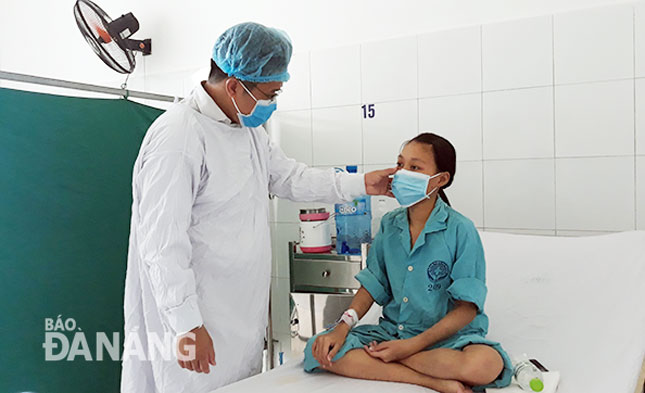Helping poor patients with end-stage renal disease get back to normal life
A total of 21 kidney transplants have been successfully performed at the Da Nang General Hospital since this venue resumed its kidney transplanting programme in 2015. In particular, behind complicated medical cases are stories deeply imbued with the humanitarian spirit.
 |
| A kidney patient is recovering well after a successfully transplant |
Recently, a 6-hour-long kidney transplant was successfully performed by a total of 30- member surgical team.
The kidney recipient was 24-year-old woman from Ngu Hanh Son District’s Hoa Hai Ward, and the donor was her 44-year-old birth-mother.
Previously, the female patient had been diagnosed with chronic renal failure, and she had undergone periodic haemodialysis treatment at the hospital over the past 4 months, with 3 times a week at the hospital’s Nephrology-Endocrinilogy Ward.
The kidney recipient is now making a good recovery from her tough operation, and she is expected to be discharged from the hospital over the coming days.
The Da Nang General Hospital has been recognised by the Ministry of Health as one of Viet Nam’s medical establishments performing kidney transplants with the help of surgeons from the Ho Chi Minh City-based Cho Ray Hospital and the world’s leading experts.
Doctor Dang Anh Dao, the Head of the Urologic Surgery Department of the city’s hospital, remarked that those with end stage renal disease (ESRD) are required to undergo kidney transplants.
Kidney transplants involving blood relations have much higher success rates. People who receive a kidney from a living donor usually have fewer complications than those who receive a kidney from a deceased donor.
A kidney transplant involves many complicated surgical techniques, and requires a total of 100 medical tests of various types.
A kidney transplant now costs between around 150 million VND and 200 million VND at the city’s hospital which is much cheaper than in other large medical establishments nationwide.
Encouragingly, the costs of kidney transplants over the past 3 years have been funded by donors from both home and abroad through financial aid appeals made by the hospital.
Doctor Le Duc Nhan, the Director of the hospital, said patients with chronic renal failure not only face the problem of depression and at high risk of death, but they also encounter financial difficulties as long-term treatment for this life-threatening disease causes their families to fall into poverty. In reality, transplant procedure is not covered by insurance.
For this reason, the hospital has become actively engaged in appealing for more financial aids from organisations and individuals from both home and abroad to help these needy patients.
A cheap accommodation area on the 4th floor of the Centre for Radiotherapy and Nuclear Medicine at the hospital is now home to over 30 poor patients from outside the city.
They are all suffering from chronic renal failure, and are required to have periodic haemodialysis treatment. Although the patients are not related, they all share the accommodation and feel as if they are part of one big family.
The benefit of kidney transplants is undeniable as the kidney can operate healthily for many years. Patients can go back to a normal life, and not have to spend 3 days a week having their blood filtered.
In early this year, the municipal People’s Committee gave a nod to the establishment of the Organ Transplantation Centre at a cost of over 700 billion VND.
The venue is expected to lay a firm foundation for the development of kidney and stem cell transplantation in the near future, and afterwards, liver, heart and corneal transplantation services, for people from Da Nang and elsewhere in Central Viet Nam.
The hospital is now preparing human resources and technical equipment, especially accessing the world’s advanced medical techniques for organ transplantation.
In Viet Nam, where organ donation is considered a taboo as many believe one should die wholly for the afterlife, black market kidney transactions have been still rampant. Therefore, a healthcare ethics committee has already been established at the city’s hospital, and this unit is responsible for considering, debating, studying, taking action on, or reporting on ethical issues that arise in kidney transplantation process.
Special heed is paid to verifying the legal and ethical aspects of kidney donation and transplantation, and the relationships between kidney recipients and donors as well.
Dossiers on kidney transplants performed at the city’s hospital are required to be sent to the National Coordinating Centre for Human Organ Transplantation for management.




